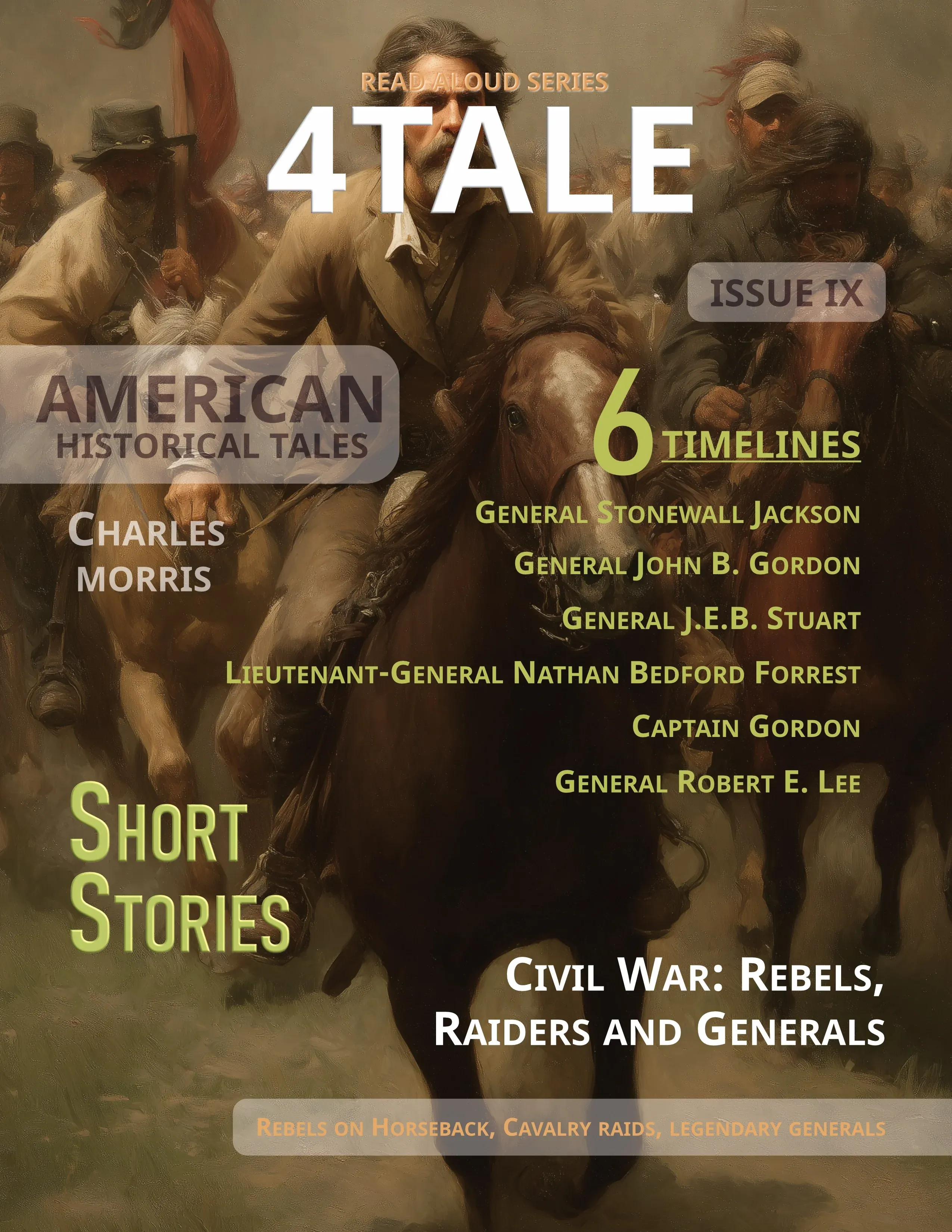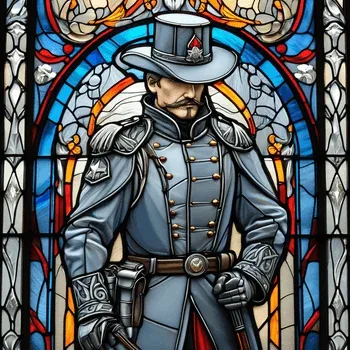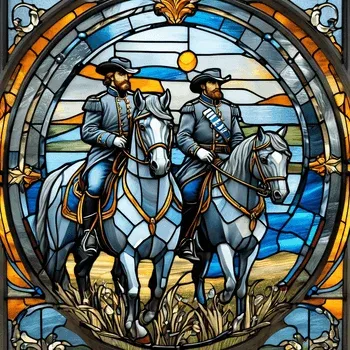Of all the minor operations of the Civil War, the one most marked at once by daring and success was the pioneer invasion of the Northern States, the notable Chambersburg raid of the most famous cavalry leader of the Confederacy, General J E B Stuart. This story of bold venture and phenomenal good fortune, though often told, is worth giving again in its interesting details.
The interim after the battle of Sharpsburg or Antietam was one of rest and recuperation in both the armies engaged. During this period the cavalry of Lee's army was encamped in the vicinity of Charlestown, some ten miles to the southward of Harper's Ferry.
Stuart's head-quarters were located under the splendid oaks which graced the lawn of "The Bower," whose proprietor, Mr. A S Dandridge, entertained the officers with an open-hearted and genial hospitality which made their stay one of great pleasure and enjoyment.
There were warriors in plenty who would not have been hasty to break up that agreeable period of rest and social intercourse, but Stuart was not of that class. He felt that he must be up and doing, demonstrating that the Army of Northern Virginia had not gone to sleep; and the early days of October, 1862, saw a stir about head-quarters which indicated that something out of the ordinary was afoot.
During the evening of the 8th the officers were engaged in a lively social intercourse with the ladies of "The Bower," the entertainment ending in a serenade in which the banjo and fiddle took chief part. Warlike affairs seemed absent from the thoughts of all, with the exception that the general devoted more time than usual to his papers.
With the morning of the 9th a new state of affairs came on. The roads suddenly appeared full of well-mounted and well-appointed troopers, riding northward with jingling reins and genial calls, while the cheery sound of the bugle rang through the fresh morning air.
There were eighteen hundred of these horsemen, selected from the best mounted and most trustworthy men in the corps, for they were chosen for an expedition that would need all their resources of alertness, activity, and self-control, no less a one than an invasion of Pennsylvania, a perilous enterprise in which the least error might expose them all to capture or death.
On reaching the appointed place of rendezvous, at Darksville, Stuart issued an address in which he advised his followers that the enterprise in which they were to engage demanded the greatest coolness, decision, and courage, implicit obedience to orders, and the strictest order and sobriety.
While the full purpose of the expedition must still be kept secret, he said, it was one in which success would reflect the highest credit on their arms. The seizure of private property in the State of Maryland was strictly prohibited, and it was to be done in Pennsylvania only under orders from the brigade commanders, individual plundering being strongly forbidden.
These preliminaries adjusted, the march northward began, the command being divided into three detachments of six hundred men each, under the direction of General Wade Hampton.
Colonel W H F Lee, and Colonel W E Jones.
A battery of four guns accompanied the expedition. It was with high expectations that the men rode forward, the secrecy of the enterprise giving it an added zest. Most of them had followed Stuart in daring rides in the earlier months of that year, and all were ready to follow wherever he chose to lead.
Darkness had fallen when they reached Hedgesville, the point on the Potomac where it was designed to cross. Here they bivouacked for the night, a select party of some thirty men being sent across the river, their purpose being to capture the Federal picket on the Maryland side. In this they failed, but the picket was cut off from its reserve, so that the fugitives were not able to report the attack.
Day had not dawned when all the men were in their saddles, and as soon as word of the result of the night's enterprise was received, the foremost troops plunged into the river and the crossing began. It was completed without difficulty, and Colonel Butler, leading the advance, rode briskly forward to the National turnpike which joins Hancock and Hagerstown.
Along this road, a few hours before, General Cox's division of Federal infantry had passed, Butler coming so close to his rear that the stragglers were captured. But a heavy fog covered the valley and hid all things from sight, so that Cox continued his march in ignorance that a strong body of Confederate cavalry was so close upon his track.
On Fairview Heights, near the road, was a Federal signal-station, which a squad was sent to capture. The two officers in charge of it escaped, but two privates and all its equipments were taken.
Yet, despite all efforts at secrecy, the march had not gone on unseen. A citizen had observed the crossing and reported it to Captain Logan of the Twelfth Illinois Cavalry, and the news spread with much rapidity. But there was no strong force of cavalry available to check the movement, and Stuart's braves passed steadily forward unopposed.
Their line of march was remote from telegraph or railroad, and the Pennsylvania farmers, who did not dream of the war invading their fields, were stricken with consternation when Stuart's bold riders crossed Mason and Dixon's line and appeared on their soil.
It was hard for them to believe it. One old gentleman, whose sorrel mare was taken from his cart, protested bitterly, saying that orders from Washington had forbidden the impressment of horses, and threatening the vengeance of the government on the supposed Federal raiders. A shoe merchant at Mercersburg completely equipped Butler's advance guard with foot-wear, and was sadly surprised when paid with a receipt calling on the Federal government to pay for damages.
While nothing was disturbed in Maryland, horses were diligently seized in Pennsylvania, the country on both sides of the line of march being swept clean of its farm animals. Ladies on the road, however, were not molested, and the men were strictly prohibited from seizing private property—even from taking provisions for themselves.
Chambersburg, the goal of the expedition, was reached on the evening of the 10th, after a day's hard ride. So rapid and well conducted had been the journey that as yet scarce one enemy had been seen; and when the town was called on to surrender within thirty minutes, under penalty of a bombardment, resistance was out of the question; there was no one capable of resisting, and the troops were immediately marched into the town, where they were drawn up in the public square.
The bank was the first place visited. Colonel Butler, under orders from his chief, entered the building and demanded its funds. But the cashier assured him that it was empty of money, all its cash having been sent away that morning, and convinced him of this by opening the safe and drawers for his inspection.
Telegraphic warning had evidently reached the town. Butler had acted with such courtesy that the cashier now called the ladies of his family, and bade them to prepare food for the men who had made the search. That the captors of the town behaved with like courtesy throughout we have the evidence of Colonel A K McClure, subsequently editor of the Philadelphia Times, who then dwelt in the near vicinity of Chambersburg.
Though a United States officer and subject to arrest or parole, and though he had good opportunity to escape, he resolved to stay and share the fate of his fellow-townsmen. We quote from his description of the incidents of that night. After speaking of an interview he had—as one of the committee of three citizens to surrender the town—with General Hampton, and the courteous manner of the latter, he proceeds:
"With sixty acres of corn in shock, and three barns full of grain, excellent farm and saddle horses, and a number of best blooded cattle, the question of property was worthy of a thought. I resolved to stay, as I felt so bound by the terms of surrender, and take my chances of discovery and parole....
"I started in advance of them for my house, but not in time to save the horses. I confidently expected to be overrun by them, and to find the place one scene of desolation in the morning. I resolved, however, that things should be done soberly, if possible, and I had just time to destroy all the liquors about the house.
As their pickets were all around me I could not get it off. I finished just in time, for they were soon upon me in force, and every horse in the barn, ten in all, was promptly equipped and mounted by a rebel cavalryman. They passed on towards Shippensburg, leaving a picket force on the road.
"In an hour they returned with all the horses they could find, and dismounted to spend the night on the turnpike in front of my door. It was now midnight, and I sat on the porch observing their movements. They had my best corn-field beside them and their horses fared well. In a little while one entered the yard, came up to me, and after a profound bow, politely asked for a few coals to start a fire.
I supplied him, and informed him as blandly as possible where he would find wood conveniently, as I had dim visions of camp-fires made of my palings. I was thanked in return, and the mild-mannered villain proceeded at once to strip the fence and kindle fires. Soon after a squad came and asked permission to get some water. I piloted them to the pump, and again received a profusion of thanks....
"About one o'clock, half a dozen officers came to the door and asked to have some coffee made for them, offering to pay liberally for it in Confederate scrip. After concluding a treaty with them on behalf of the colored servants, coffee was promised them, and they then asked for a little bread with it.
They were wet and shivering, and, seeing a bright, open wood-fire in the library, they asked permission to enter and warm themselves until their coffee should be ready, assuring me that under no circumstances should anything in the house be disturbed by their men. I had no alternative but to accept them as my guests until it might please them to depart, and I did so with as good grace as possible.
"Once seated round the fire all reserve seemed to be forgotten on their part, and they opened a general conversation on politics, the war, the different battles, the merits of generals of both armies. They spoke with entire freedom upon every subject but their movement into Chambersburg. Most of them were men of more than ordinary intelligence and culture, and their demeanor was in all respects eminently courteous. I took a cup of coffee with them, and have never seen anything more keenly relished. They said that they had not tasted coffee for weeks before, and that then they had paid from six to ten dollars per pound for it.
When they were through they asked whether there was any coffee left, and finding that there was some, they proposed to bring some more officers and a few privates, who were prostrated by exposure, to get what was left. They were, of course, as welcome as those present, and on they came in squads of five or more until every grain of brown coffee was exhausted. Then they asked for tea, and that was served to some twenty more.
"In the mean time a subordinate officer had begged of me a little bread for himself and a few men, and he was supplied in the kitchen. He was followed by others in turn, until nearly a hundred had been supplied with something to eat or drink. All, however, politely asked permission to enter the house, and behaved with entire propriety.
They did not make a single rude or profane remark, even to the servants. In the mean time the officers who had first entered the house had filled their pipes from the box of Killikinick on the mantel—after being assured that smoking was not offensive—and we had another hour of free talk on matters generally....
"At four o'clock in the morning the welcome blast of the bugle was heard, and they rose hurriedly to depart. Thanking me for the hospitality they had received, we parted, mutually expressing the hope that should we ever meet again, it would be under more pleasant circumstances. In a few minutes they were mounted and moved into Chambersburg. About seven o'clock I went into town....
"General Stuart sat on his horse in the centre of the town, surrounded by his staff, and his command was coming in from the country in large squads, leading their old horses and riding the new ones they had found in the stables hereabouts. General Stuart is of medium size, has a keen eye, and wears immense sandy whiskers and moustache.
His demeanor to our people was that of a humane soldier. In several instances his men commenced to take private property from stores, but they were arrested by General Stuart's provost-guard. In a single instance only, that I heard of, did they enter a store by intimidating the proprietor. All of our stores and shops were closed, and with a very few exceptions were not disturbed."
This was certainly not like the usual behavior of soldiers on foreign soil, and the incident at once illustrates the strict control which General Stuart held over his men and the character of the men themselves, largely recruited, as they were, from the higher class of Southern society. Though Colonel McClure evidently felt that the lion's claws lay concealed under the silken glove, he certainly saw no evidence of it in the manners of his unbidden guests.
Return was now the vital question before General Stuart and his band. Every hour of delay added to the dangers surrounding them. Troops were hastily marching to cut off their retreat; cavalry was gathering to intercept them; scouts were watching every road and every movement.
Worst of all was the rain, which had grown heavy in the night and was now falling steadily, with a threat of swelling the Potomac and making its fords impassable. The ride northward had been like a holiday excursion; what would the ride southward prove?
With the dawn of day the head of the column set out on the road towards Gettysburg, no damage being done in the town except to railroad property and the ordnance store-house, which contained a large quantity of ammunition and other army supplies. This was set on fire, and the sound of the explosion, after the flames reached the powder, came to the ears of the vanguard when already at a considerable distance on the return route.
At Cashtown the line turned from the road to Gettysburg and moved southward, horses being still diligently collected till the Maryland line was crossed, when all gathering of spoil ceased. Emmittsburg was reached about sunset, the hungry cavaliers there receiving a warm welcome and being supplied with food as bountifully as the means of the inhabitants permitted.
Meanwhile, the Federal military authorities were busy with efforts to cut off the ventursome band. The difficulty was to know at what point on the Potomac a crossing would be sought, and the troops were held in suspense until Stuart's movements should unmask his purpose.
General Pleasanton and his cavalry force were kept in uncertain movement, now riding to Hagerstown, then, on false information, going four miles westward, then, halted by fresh orders, turning east and riding to Mechanicstown, twenty miles from Hagerstown. They had marched fifty miles that day, eight of which were wasted, and when they halted, Stuart was passing within four miles of them without their knowledge.
Midnight brought Pleasanton word of Stuart's movements, and the weary men and horses were put on the road again, reaching the mouth of the Monocacy about eight o'clock the next morning. But most of his command had dropped behind in that exhausting ride of seventy-eight miles within twenty-eight hours, only some four hundred of them being still with him.
While the Federals were thus making every effort to cut off the bold raiders and to garrison the fords through a long stretch of the Potomac, Stuart was riding south from Emmittsburg, after a brief stop at that place, seeking to convey the impression by his movements that he proposed to try some of the upper and nearer fords.
His real purpose was to seek a crossing lower down, so near to the main body of the Federals that they would not look for him there. Yet the dangers were growing with every moment, three brigades of infantry guarded the lower fords, Pleasanton was approaching the Monocacy, and it looked as if the bold raider was in a net from which there could be no escape.
Stuart reached Hyattstown at daylight on the 12th, having marched sixty-five miles in twenty hours. The abundance of captured horses enabled him to make rapid changes for the guns and caissons and to continue the march without delay. Two miles from Hyattstown the road entered a large piece of woodland, which served to conceal his movements from observation from any signal-tower. Here a disused road was found, and, turning abruptly to the west, a rapid ride was made under cover.
Soon after the open country was reached again a Federal squadron was encountered; but it was dispersed by a charge, and from this point a rapid ride was made for White's Ford, the nearest available crossing. All now seemed to depend upon whether this ford was occupied in force by the enemy.
As Colonel Lee approached it this question was settled; what appeared a large body of Federal infantry was in possession, posted on a steep bluff quite close to the ford. It seemed impossible to dislodge it, but foes were closing up rapidly from behind, and if all was not to be lost something must be done, and done at once.
To attack the men on the bluff seemed hopeless, and before doing so Lee tried the effect of putting a bold face on the matter. He sent a messenger under a flag of truce, telling the Federal commander that Stuart's whole force was before him, that resistance was useless, and calling on him to surrender.
If this was not done in fifteen minutes a charge in force would be made. The fifteen minutes passed. No sign of yielding appeared. Lee, with less than a forlorn hope of success, opened fire with his guns and ordered his men to advance. He listened for the roar of the Federal guns in reply, when a wild shout rang along the line.
"They are retreating! Hurrah! they are retreating!"
Such was indeed the case. The infantry on the bluff were marching away with flying flags and beating drums, abandoning their strong position without a shot. A loud Confederate cheer followed them as they marched. No shot was fired to hinder them. Their movement was the salvation of Stuart's corps, for it left an open passage to the ford, and safety was now assured.
But there was no time to lose. Pleasanton and his men might be on them at any minute. Other forces of the enemy were rapidly closing in. Haste was the key to success. One piece of artillery was hurried over the dry bed of the canal, across the river ford, and up the Virginia bluff, where it was posted to command the passage.
Another gun was placed so as to sweep the approaches on the Maryland side, and soon a stream of horsemen were rapidly riding through the shallow water to Virginia and safety. With them went a long train of horses captured from Pennsylvania farms.
Up came the others and took rapidly to the water, Pelham meanwhile facing Pleasanton with a single gun, which was served with all possible rapidity. But there was one serious complication. Butler with the rear-guard had not yet arrived, and no one knew just where he was. Stuart, in deep concern for his safety, sent courier after courier to hasten his steps, but no tidings came back.
"I fear it is all up with Butler," he said, despondently. "I cannot get word of him, and the enemy is fast closing in on his path."
"Let me try to reach him," said Captain Blackford, to whom the general had spoken.
After a moment's hesitation Stuart replied,—
"All right! If we don't meet again, good-by, old fellow! You run a desperate chance of being raked in."
Away went Blackford at full speed, passing the lagging couriers one by one, and at length reaching Butler, whom he found halted and facing the enemy, in complete ignorance of what was going on at the front. He had his own and a North Carolina regiment and one gun.
"We are crossing the ford, and Stuart orders you up at once," shouted Blackford. "Withdraw at a gallop or you will be cut off."
"Very good," said Butler, coolly. "But how about that gun? I fear the horses can't get it off in time."
"Let the gun go. Save yourself and your men."
Butler did not see it in that light. Whip and spur were applied to the weary artillery horses, and away they went down the road, whirling the gun behind them, and followed at a gallop by Butler and his men. As they turned towards the ford they were saluted by the fire of a Federal battery.
Further on the distant fire of infantry from down the river reached them with spent balls. Ten minutes later and the rear-guard would have been lost. As it was, a wild dash was made across the stream and soon the last man stood on Virginia soil. The expedition was at an end, and the gallant band was on its native heath once more.
Thus ended Stuart's famous two days' ride. The first crossing of the Potomac had been on the morning of the 10th. The final crossing was on the morning of the 12th. Within twenty-seven hours he had ridden eighty miles, from Chambersburg to White's Ford, with his artillery and captured horses, and had crossed the Potomac under the eyes of much superior numbers, his only losses being the wounding of one man and the capture of two who had dropped out of the line of march—a remarkable record of success, considering the great peril of the expedition.
The gains of the enterprise were about twelve hundred horses, but the great strain of the ride forced the men to abandon many of their own. Stuart lost two of his most valued animals—Suffolk and Lady Margrave—through the carelessness of his servant Bob, who, overcome by too free indulgence in ardent spirits, fell out of the line to take a nap, and ended by finding himself and his horses in hostile hands.
The value of the property destroyed at Chambersburg, public and railroad, was estimated at two hundred and fifty thousand dollars; a few hundred sick and wounded soldiers were paroled, and about thirty officials and prominent citizens were brought off as prisoners, to be held as hostages for imprisoned citizens of the Confederacy.
On the whole, it was eminently a dare-devil enterprise of the type of the knightly forays of old, its results far less in importance than the risk of loss to the Confederacy had that fine body of cavalry been captured.
Yet it was of the kind of ventures calculated to improve the morale of an army, and inspire its men to similar deeds of daring and success. Doubtless it gave the cue to Morgan's later and much less fortunate invasion of the North.








